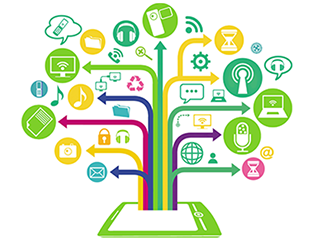|
IPv6 over Bluetooth Low Energy (L)Status: Abgeschlossen
Abstract—Recent research and standardization efforts for the Internet of Things (IoT) have resulted in technological building blocks. Yet the integration of these blocks into real-world applications still remains challenging. To this end, this project aims at the design and implementation of an IoT sensing system that integrates the current state of the art: a low-power hardware platform with sensing, computation, and communication capabilities and a back-end service platform. BackgroundThe Internet of Things (IoT) allows for the interconnection between the virtual world of computers and the physical world of our everyday lives. Recent advances in the field of wireless sensor networks and the standardization of Internet protocols for constrained environment allow for the seamless integration of low-power sensor nodes into the Internet with Web-based services. At the lower layers, Bluetooth Low Energy (BLE) is a new, interesting technology with a high availability of inexpensive systems-on-a-chip (SoCs) for low-power communication. A draft specification foresees a binding of IPv6 for Low-power Wireless Personal Area Networks (6LoWPAN) for BLE. Having IP on the sensor nodes, the Constrained Application Protocol (CoAP) can directly provide RESTful Web services on the low-power platform. This allows for powerful IoT applications that use real-time sensor values to optimize business processes, improve the quality of life, or increase safety in critical environments. ObjectivesThe student shall evaluate the nRF51 platform and software solutions provided by Nordic Semiconductors to establish grounds for upcoming BLE projects. For this, different evaluation boards should be put into operation, thereby assembling the necessary toolchain including programmers and hardware adapters. A particular focus is on the IoT SDK and its applicability for systems research and prototypes. The final report shall include a comprehensive "getting started" guide. Furthermore, the IoT SDK shall be benchmarked and compared to alternatives in collaboration with a bachelor's thesis student. Student/Bearbeitet von: Ganesh Ramanathan, (Arthur Habicht [B])Contact/Ansprechpartner: Matthias Kovatsch |
|
|